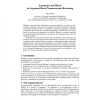Free Online Productivity Tools
i2Speak
i2Symbol
i2OCR
iTex2Img
iWeb2Print
iWeb2Shot
i2Type
iPdf2Split
iPdf2Merge
i2Bopomofo
i2Arabic
i2Style
i2Image
i2PDF
iLatex2Rtf
Sci2ools
100
click to vote
EPIA
1995
Springer
1995
Springer
Arguments and Defeat in Argument-Based Nonmonotonic Reasoning
Abstract. Argument-based formalisms are gaining popularity as models of nonmonotonic reasoning. Central in such formalisms is a notion of argument. Arguments are formal reconstructions of how a conclusion is supported. Generally, an argument is defeasible. This means that an argument supporting a conclusion does not always justify its conclusion: the argument can be defeated. Whether a conclusion supported by an argument is justified depends on the structure of the argument and on the other arguments available. In this paper, we argue for four points that are refinements of how arguments and defeat have been used in argument-based nonmonotonic reasoning. First we argue that an argument can be defeated because it contains a weak sequence of steps; second that arguments accrue, which means that arguments for a conclusion reinforce each other; third that defeat can be compound, which means that groups of arguments can defeat other groups of arguments; fourth that defeated arguments must b...
Argument-based Formalisms | Artificial Intelligence | EPIA 1995 | Formal Reconstructions | Nonmonotonic Reasoning |
Related Content
| Added | 26 Aug 2010 |
| Updated | 26 Aug 2010 |
| Type | Conference |
| Year | 1995 |
| Where | EPIA |
| Authors | Bart Verheij |
Comments (0)

